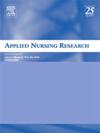The effect of gender role stress on psychological distress in pregnant women
IF 2.7
4区 医学
Q1 NURSING
引用次数: 0
Abstract
Aim
To examine the effect of gender role stress on psychological distress in pregnant women.
Background
Recognition and prevention of potential psychological as well as physiological adversities during pregnancy are critical in terms of reducing their impacts on mother and baby health and developing preventive health services.
Methods
This cross-sectional study was conducted with 182 volunteer pregnant women in Türkiye. Data were collected using a Personal Information Form, an Obstetric Characteristics Information Form, the Feminine Gender Role Stress Scale (FGRSS), and the Kessler Psychological Distress Scale (K10-PDS). Data analysis included independent samples t-test, one-way analysis of variance, Duncan test, Pearson correlation coefficient, and linear regression analysis.
Results
The mean K10-PDS score of the pregnant women was 37.55 ± 8.87, which showed they were likely to have a severe mental disorder. There was a statistically significant difference between scale scores according to education level, perceived income, intervention of people outside the home, marital adjustment, and the presence of a health problem during the current pregnancy (p < 0.05). It was determined that there was a weak negative relationship between the FGRSS and K10-PDS (r = −0.283; p < 0.001) and that feminine gender role stress had an effect on psychological distress (F = 7332; p < 0.001).
Conclusions
The results of the study draw attention to pregnant women's need for psychological support. To reduce the adverse psychological effects of gender role stress on pregnant women in prenatal care services, studies on factors affecting adaptation to the pregnancy process can be planned.
性别角色压力对孕妇心理困扰的影响
目的探讨性别角色应激对孕妇心理困扰的影响。背景认识和预防怀孕期间潜在的心理和生理逆境对于减少其对母婴健康的影响和发展预防性保健服务至关重要。方法采用横断面研究方法,对182名自愿怀孕的 kiye妇女进行研究。使用个人信息表、产科特征信息表、女性性别角色压力量表(FGRSS)和Kessler心理困扰量表(K10-PDS)收集数据。资料分析采用独立样本t检验、单因素方差分析、Duncan检验、Pearson相关系数和线性回归分析。结果孕妇K10-PDS平均(37.55±8.87)分,可能存在严重的精神障碍。根据教育水平、感知收入、家庭以外的人的干预、婚姻调整和当前怀孕期间是否存在健康问题,量表得分之间存在统计学上的显著差异(p <;0.05)。结果表明,FGRSS与K10-PDS呈弱负相关(r = - 0.283;p & lt;0.001),女性性别角色压力对心理困扰有影响(F = 7332;p & lt;0.001)。结论本研究结果引起人们对孕妇心理支持需求的重视。为了减少产前护理服务中性别角色压力对孕妇的不良心理影响,可以有计划地研究影响怀孕过程适应的因素。
本文章由计算机程序翻译,如有差异,请以英文原文为准。
求助全文
约1分钟内获得全文
求助全文
来源期刊

Applied Nursing Research
医学-护理
CiteScore
4.50
自引率
0.00%
发文量
65
审稿时长
70 days
期刊介绍:
Applied Nursing Research presents original, peer-reviewed research findings clearly and directly for clinical applications in all nursing specialties. Regular features include "Ask the Experts," research briefs, clinical methods, book reviews, news and announcements, and an editorial section. Applied Nursing Research covers such areas as pain management, patient education, discharge planning, nursing diagnosis, job stress in nursing, nursing influence on length of hospital stay, and nurse/physician collaboration.
 求助内容:
求助内容: 应助结果提醒方式:
应助结果提醒方式:


